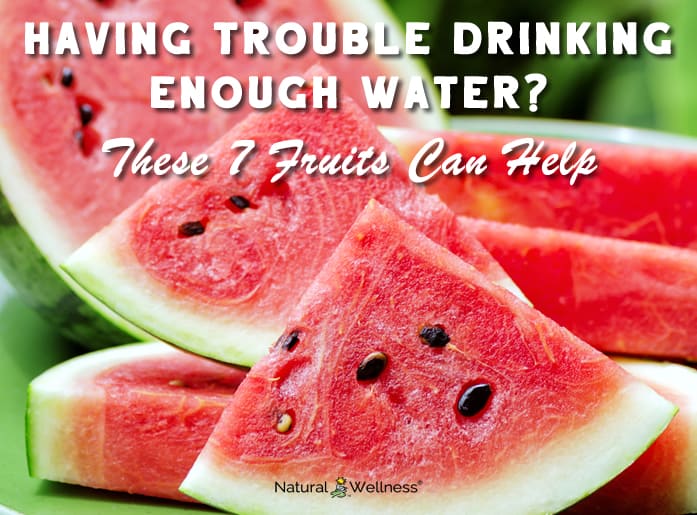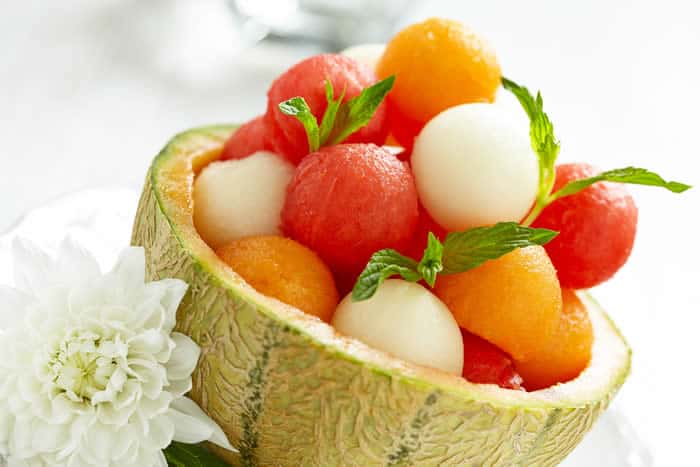

There’s a reason it’s recommended that we drink a certain amount of water each day. Several, actually.
Water not only keeps our cells alive but it also helps prevents our bodies from overheating, assists with the transportation of nutrients in our bloodstream, aids in waste elimination, and lubricates our joints. (1)
Yet, this doesn’t always make it easier to drink.
One complaint people have about drinking water is that it’s tasteless. It doesn’t satisfy the taste buds, especially when there are so many other delicious beverage choices from which to choose. But getting adequate water is important to stave off dehydration, which can leave you feeling tired and dizzy in mild cases and increase your heartbeat and breathing, even putting you at risk of going into shock if the dehydration is severe. (2)
If you struggle to get your recommended daily water intake—which is roughly 125 ounces a day for men and 91 ounces for women, from both beverages and foods (3)—here are a few fruits that contain quite a bit of water, as well as other health-boosting nutrients.
1. Watermelon
Bite into a chunk of watermelon and you’ll instantly feel your mouth fill with its water and other juices. This fruit also has antioxidant, anti-inflammatory, and antihypertensive properties while supplying the body with a number of vitamins and minerals, some of which include vitamins B, C, and E, phosphorus, magnesium, calcium, and iron. (4)
2. Cantaloupe
Roughly 42% of a cantaloupe’s total weight is its juice, which supplies the body with carotenoids and vitamin C while boosting antioxidant activity. (5)
Fill your bowl with both cantaloupe and watermelon and you can enjoy different flavors while increasing your water intake.

3. Apples
If you’ve ever eaten an apple and had its juices dribble down your chin, you already know that this fruit has a high water content. Research also indicates that eating apples may even reduce your risk of cancer, diabetes, and cardiovascular disease while improving your lung health and aiding in weight loss. (6)
4. Strawberries
These small red berries will not only help you stay hydrated but also offer several other health benefits. Among them are fighting against inflammation and bacteria, protecting your cardiovascular and neurological systems, and reducing your risk of cancer and diabetes. (7)
5. Oranges

Like many of the other fruit, oranges supply the body with higher amounts of water while also protecting it against a variety of diseases such as cancer, cardiovascular disease, and neurological conditions. (8) But oranges offer another benefit as well. Just the smell of this fruit can help reduce your anxiety! (9)
6. Pineapple
As much as 86.2% of pineapple is moisture, with this fruit also providing a “considerable amount” of calcium, potassium, vitamin C, and fiber. (10) Pineapple is good when eaten on its own or you can add it to some of your favorite recipes, such as making a pineapple salsa.
7. Peaches
The list of health benefits associated with this high-in-water fruit is long and includes providing preventive effects against diabetes, obesity, hypertension, inflammation, and many diseases, namely those that are cardiovascular, neurodegenerative, or oncologic in nature. (11) Plus, they just taste good.
Final Thoughts
Increasing your intake of fruits such as these can help you get the water your body needs to function efficiently. Eat them as a snack or add them to the end of your meal for a sweet, yet nutritious dessert. Your taste buds will thank you, as will your health.




